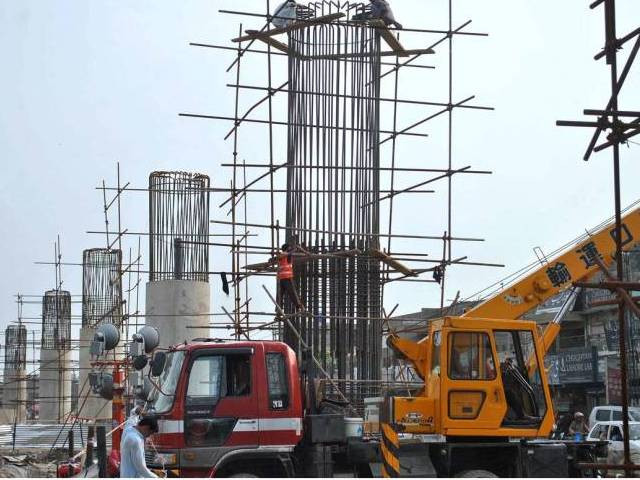ECC approves Rs20b tax exemption for Lahore’s Orange Line Metro Train
Also extends similar tax breaks to rail-based mass transit schemes in other provincial capitals

The Economic Coordination Committee (ECC) of the Cabinet took the decision after four mass transit projects, one in each provincial capital, were made, in principle, part of the China-Pakistan Economic Corridor (CPEC ) framework in the last meeting of the Joint Cooperation Committee (JCC) of the CPEC. Finance Minister Ishaq Dar chaired the ECC meeting.
Pakistan’s water security made part of CPEC framework
The ECC approved the proposal of the Planning, Development and Reform Division at the request of the Punjab government to grant exemptions from withholding tax beyond 6% of the E&M contract price, and from taxes, duties on import of equipment to be installed for the Lahore Orange Line Metro Train Project, said the Finance Ministry after the ECC meeting.
“It is a fair decision and on a uniformed basis it will be applicable to other rail-based mass transit projects in provincial capitals,” said Yousaf Naseem Khokhar, secretary in-charge of the Ministry of Planning, Development and Reform.
The Planning Ministry had moved the summary for the ECC approval.
The project envisages construction of a 27.1-km long dedicated signal free corridor for mass transit system in Lahore. The corridor will be capable of accommodating trains running both ways with a capacity of 30,000 passengers per hour. However, the project faces challenges during the construction phase, after a Lahore High Court division bench disallowed construction near 10 heritage sites. The case is also currently under adjudication of Supreme Court of Pakistan.
The Executive Committee of National Economic Council (ECNEC) had approved the project at a cost of Rs165.22 billion in May 2015 including a foreign loan of Rs103.1 billion. The government of Punjab will return the loan, obtained on sovereign guarantees.
Additional projects
Besides the Lahore Orange Line Metro Project, Karachi Circular Railway, Greater Peshawar Region Mass Transit System and Quetta Mass Transit System will be eligible for the similar tax exemptions. However, once these projects are ready for implementation, the provincial governments will have to apply for tax exemptions, said the officials.
‘Quetta, Peshawar mass transit schemes part of CPEC’
In the ECC meeting on December 20, the economic body had deferred the decision on the Punjab Orange Line project tax exemptions after other stakeholders expressed reservations. The ECC had directed the Planning Ministry to resubmit the summary after inter-divisional consultation.
After the ECC directives, the Planning Ministry had sought views from Federal Board of Revenue, Finance Division, Economic Affairs Division and Law and Justice Division & Human Rights Division. However, none of them submitted their views in writing and the Planning Ministry submitted the summary to the Cabinet Division for onward transfer to the ECC without their comments.
The ECC also decided that a similar treatment would also be extended to the other rail-based mass transit projects in Karachi, Peshawar and Quetta at the appropriate time, said the Finance Ministry.
Mass transit plans: Sindh CM wants Karachi Circular Railways to be included in CPEC
The mass transit projects in Peshawar, Karachi and Quetta are still at the planning stage. After the JCC’s decision to include, in principle, these projects in the CPEC framework, detailed feasibility studies will be carried out. After detailed studies, the PC-Is of these projects will be submitted to the ECNEC for approvals. After the ECNEC approvals, the projects will be presented to Joint Working Group on transport infrastructure of the CPEC and then it will again go back to JCC for final approval.
Concessions
According to the terms of the commercial agreement signed between government of Punjab and CR-NORINCO joint venture, the contractor will pay only 6% withholding income tax. In case of any change in tax rate, the government of Punjab will pick the difference. Secondly, the clause 27.1 of the agreement gives complete exemptions to the contractors from payments of customs, import duties and taxes.
The Punjab government has estimated the cost of these exemptions at roughly Rs20 billion, which the ECC waived off on Friday.
The Planning Ministry noted that at the time of the award of the contract the withholding rate was 6%. Later on, the FBR increased the rate to 7% for those contractors who file income tax returns and 12% for non-filers.
The fluctuations in rates highlight the inconsistency in government’s economic policies that often carry adverse implications for foreign direct investment.



















COMMENTS
Comments are moderated and generally will be posted if they are on-topic and not abusive.
For more information, please see our Comments FAQ